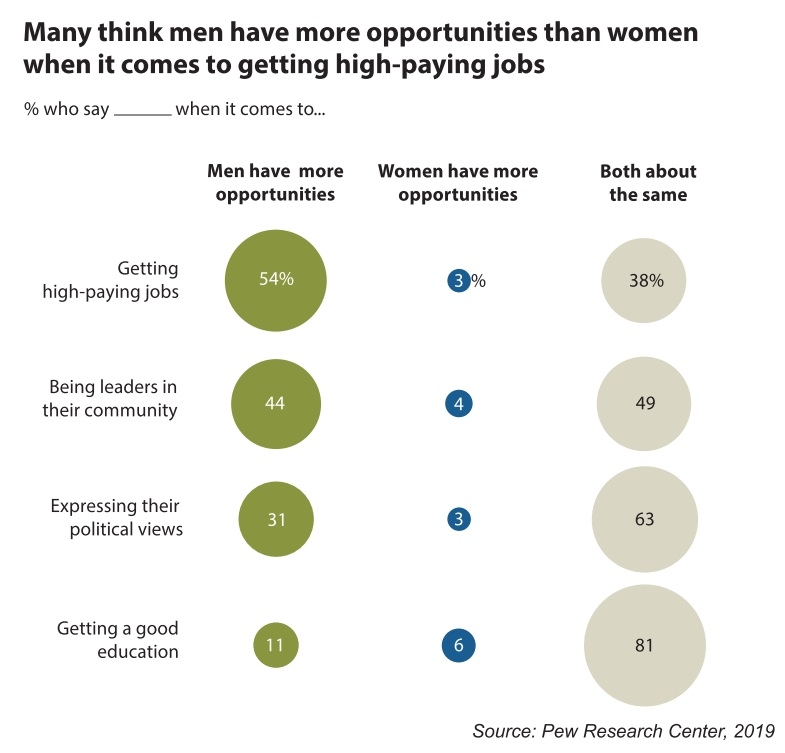Bias continues to haunt Vietnam’s gender ambitions
 |
Despite this progress, Vietnamese women still face a variety of challenges in gaining equal access to work opportunities and development in their careers.
In Vietnam, there is visible gender disparity regarding overall labour force participation within different industries. For example, men are most often targeted in job adverts for highly professional or technical jobs such as engineering and IT, despite the fact that it is illegal to discriminate based on gender, according to the Labour Code 2012, which provides broad protections against gender discrimination in the workplace, requiring employers to observe the principle of equality in recruitment, employment, promotion, and remuneration.
Despite this, job adverts often use terms like “male candidates preferred”, “being physically fit”, and “single candidates will have an edge”.
Traditionally more risky occupations such as the military, plant machine operators, and building work are occupations overwhelmingly held by men. Men are also typically recruited for jobs requiring a lot of travel such as architects and drivers.
Women are rarely recruited in these fields because of traditional views that women are the primary caregivers and homemakers for their families. This is often used as an excuse to exclude women from jobs that are deemed unfit for them by men.
Meanwhile, occupations such as receptionists, secretaries, accountants, human resources, retail, care, and textiles are often dominated by women. According to the Vietnam country brief of the International Labour Organization (ILO), healthcare dominates the occupations that are mostly filled by women. Personal care workers, healthcare assistants, pharmacists, home-based personal workers are all typically female.
Though when it comes to uneducated women, they typically find themselves working in lower-paying vulnerable occupations in key export areas such as textiles, footwear, and seafood processing. Though employment vulnerability is widely reported by both women and men in Vietnam, women are overrepresented in certain types of lower-paying vulnerable occupations or “invisible” areas of informal employment such as migrant domestic workers, homeworkers, street sellers, and the entertainment business.
A recent study by the ILO has found that gender bias continues to affect women’s job advancement in Vietnam by preventing them from climbing the corporate ladder. In this study of enterprises in Vietnam, 63 per cent said they had women in supervisory management roles, 73 per cent said they had women in middle management positions, and a mere 15 per cent said they had women in top executive positions. This phenomenon where women are under-represented in management roles is characterised as the “leaky pipeline” since it occurs at the highest levels of management.
According to the survey, 54 per cent of executives and employees at 300 organisations agreed or strongly agreed that women with equivalent skills and qualifications have a harder time obtaining top management positions than men.
Another factor that is particularly harmful and penalising to career advancement or opportunities for women is when they become a mother, this penalisation is referred to as the motherhood penalty.
According to an article published in the American Journal of Sociology, mothers are penalised in comparison to non-mothers and males, with lower perceived competence and dedication, greater professional demands, a reduced probability of being hired and promoted, and lower suggested wages. This evidence suggests that being a mother results in workplace discrimination. Additionally, women continue to shoulder the majority of work as unpaid family caregivers.
Women’s labour market possibilities and incentives will continue to be hindered as long as institutions and regulations are formed or structured around conventional gender norms.
Recent initiatives should be commended, particularly the revision of the Labour Code adopted in November 2019 which addresses a number of areas where inequalities currently exist in the country. Some of these provisions address sexual harassment in the workplace, the gender pay gap, and also offer pregnant women and new mothers greater protection from discrimination.
Other new provisions in the Labour Code address a wide range of occupations and economic activities that were previously closed to women, ostensibly for their protection, are now open to female workers as well as narrowing the gender gap in retirement age from 55 to 60.
What the stars mean:
★ Poor ★ ★ Promising ★★★ Good ★★★★ Very good ★★★★★ Exceptional
Related Contents
Latest News
More News
- Congratulations from VFF Central Committee's int’l partners to 14th National Party Congress (January 25, 2026 | 09:46)
- List of newly-elected members of 14th Political Bureau announced (January 23, 2026 | 16:27)
- 14th Party Central Committee unanimously elects To Lam as General Secretary (January 23, 2026 | 16:22)
- List of members of 14th Party Central Committee announced (January 23, 2026 | 09:12)
- Highlights of fourth working day of 14th National Party Congress (January 23, 2026 | 09:06)
- Press provides timely, accurate coverage of 14th National Party Congress (January 22, 2026 | 09:49)
- Press release on second working day of 14th National Party Congress (January 22, 2026 | 09:19)
- Minister sets out key directions to promote intrinsic strength of Vietnamese culture (January 22, 2026 | 09:16)
- 14th National Party Congress: Renewed momentum for OVs to contribute to homeland (January 21, 2026 | 09:49)
- Party Congress building momentum for a new era of national growth (January 20, 2026 | 15:00)

 Tag:
Tag:

















 Mobile Version
Mobile Version